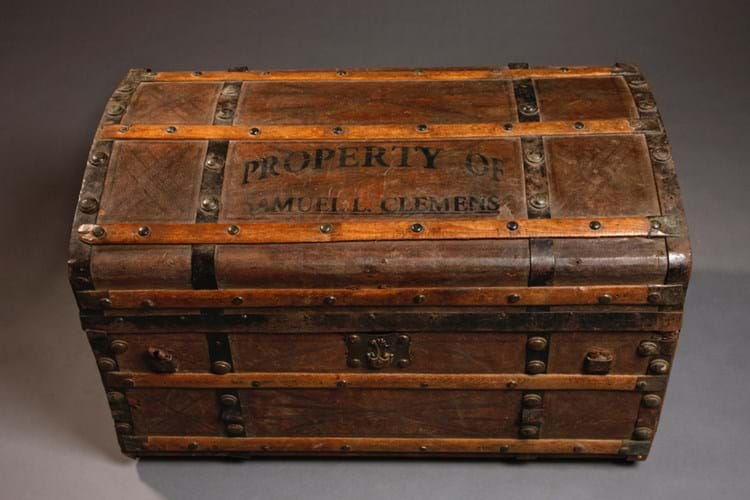
Probably acquired in 1867, while he was living in St Louis, Missouri – home town of J Barwick, the makers whose details appear on a label attached to the patterned paper lining – the wooden and tooled leather, single compartment trunk has ‘Property of Samuel Clemens’, the author’s real name, neatly painted on the shallow domed lid.
That very year saw the publication of his first book, The Celebrated Jumping Frog of Calaveras County..., and it seems the trunk may have remained in use right through the years that saw the emergence of his most famous works, Tom Sawyer (1876) and Huckleberry Finn (1885).
Inveterate Traveller
The Mississippi is the location that most people associate with the writer, but he was an inveterate traveller. Roughing It (1872) relates his adventures in the American West, but The Innocents Abroad of 1869 details his travels to Europe and the Holy Land, while A Tramp Abroad of 1880 offers another European excursion. Including his Following the Equator circumnavigation, Twain is said to have made no fewer than 29 transatlantic crossings in all.
He may also have used this trunk as a travelling writing desk, and that is perhaps why he was so critical of baggage handlers. Robert Cooper, in Around the World with Mark Twain (2000), says he called them baggage smashers and once exclaimed “Oh! How do I wish one of those trunks were filled with dynamite and that all the baggage destroyers on earth were gathered about it, and... hurled into Kingdom Come!”
Provenance
In ‘Unpacking Twain’s Trunk’, an article in an April 2016 issue of Fine Books & Collections, Jonathan Cooper explains that the trunk was acquired at a Kansas City, Missouri, auction by Don Bearden, a stained glass craftsman and lifelong admirer of the writer who then embarked on a determined and thorough investigation into its origins.
Bearden contacted everybody from historical societies and museums to conservators and scientists, even the FBI, while “trying to unpack the trunk’s history”.
At one point he took it along to a PBS Antiques Roadshow in Little Rock, Arkansas, but though offered the chance to go on-air, turned it down because he believed the trunk to be worth far more than the sum suggested by the show’s experts.
When that FB&C article appeared, Bearden was still looking to a time when he might sell it to a museum or an institution.
Instead it will now be offered at the Heritage sale where Bearden seems likely to forsake the advice that Mark Twain wrote in his 1897 account of a journey around the British Empire, Following the Equator...: “The proverb says: separate not yourself from the baggage.”





